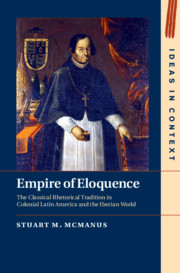 Empire of Eloquence
Empire of Eloquence Book contents
- Empire of Eloquence
- Ideas in Context
- Empire of Eloquence
- Copyright page
- Dedication
- Contents
- Figures
- Acknowledgments
- Abbreviations
- Introduction
- Chapter 1 The Foundations of the Empire of Eloquence
- Chapter 2 Philip IV’s Global Empire of Eloquence
- Chapter 3 A Japanese Cicero Redivivus
- Chapter 4 Indo-Humanist Eloquence
- Chapter 5 Centers, Peripheries and Identities in the Empire of Eloquence
- Chapter 6 The Republic of Eloquence
- Bibliography
- Index
Chapter 5 - Centers, Peripheries and Identities in the Empire of Eloquence
Published online by Cambridge University Press: 09 April 2021
- Empire of Eloquence
- Ideas in Context
- Empire of Eloquence
- Copyright page
- Dedication
- Contents
- Figures
- Acknowledgments
- Abbreviations
- Introduction
- Chapter 1 The Foundations of the Empire of Eloquence
- Chapter 2 Philip IV’s Global Empire of Eloquence
- Chapter 3 A Japanese Cicero Redivivus
- Chapter 4 Indo-Humanist Eloquence
- Chapter 5 Centers, Peripheries and Identities in the Empire of Eloquence
- Chapter 6 The Republic of Eloquence
- Bibliography
- Index
Summary
Chapter 5 argues that the classical rhetorical tradition was not only a means to disseminate Iberianized Catholicism or the “negotiated” political ideology of the Hispanic Monarchy, but also shaped the expression of local identities, including creole patriotism (patriotismo criollo) in New Spain. In particular, this chapter focuses on a little-known late humanist Latin oration delivered in 1745 at the Royal and Pontifical University in Mexico City, which represents the first “Mexican” reaction to the Bibliotheca Mexicana controversy, a transatlantic debate started by a prominent Spanish antiquarian Manuel Martí (1663–1737) who claimed that the New World was an intellectual desert. Foregrounding this largely unknown episode in the most important intellectual controversy of the eighteenth-century Iberian Atlantic allows us to interrogate how membership in the Iberian World was constructed, and in particular how local patriotisms interacted with larger Iberian political and cultural identities. In the end, it seems that the identity of so-called creoles (American-born Spaniards) was constructed within a larger pan-Hispanic and pan-Catholic identity centered on membership in the larger space of the Iberian World and the “Republic of Letters.”
Keywords
- Type
- Chapter
- Information
- Empire of EloquenceThe Classical Rhetorical Tradition in Colonial Latin America and the Iberian World, pp. 190 - 227Publisher: Cambridge University PressPrint publication year: 2021
